School Education Program
Started in 2006
Dharwad, Bengaluru, Kodagu,
Mysuru, Kalaburagi, Kolar, Chikkaballapur
Building Human &
Social Capital
Community centric
partnership
Local, innovative & replicable solutions
Quality education for Govt. school students through infrastructure, learning aids, technology enabled education, health & hygiene awareness
Complementing & supplementing learning activities at Govt. Schools
SVYM started working with the Department of School Education, Government of Karnataka in the 1990s to promote access to school education with a focus on the girl child and the children in underprivileged communities. In addition to addressing challenges like the remote locations and shortage of teachers, the program evolved with the changing needs of the community to focus on promoting scientific temperament amongst the students along with facilitating peer-to-peer learning. Today, the School Education Programs of SVYM work with over 300 Government schools across the state of Karnataka.
The program aims to build a conducive learning environment in the schools and the society at large for the every child by augmenting learning resources, promoting career awareness especially STEM, providing financial assistance and enhancing community participation.
The program has been accepted by the Education Department and in multiple districts, seen as a partner for promoting science education and ensuring low or no dropout rates. The pilots with the inclusion of electronics-based DIY kits, vacation camps and the coding platform in Kannada have been successful. The resource centre-based approach to creating opportunities for gifted students in Mysore was received well by both teachers and students. The student’s performance in NMMS was much better than in the earlier years. We intend to expand these pilots to all project locations.
With the standardized models across the age groups, the program has matured to be scaled up further within the state of Karnataka as well as outside. The program shall continue to focus on areas with very poor educational indicators and underserved communities along with creating opportunities for corporate volunteers to engage with the other stakeholders in the project area.
Key Impact
250+
Govt Schools engaged by the School Education Program in Karnataka
40,000+
Students reached in Govt. schools
200+
Scholarships awarded to meritorious students from poor socio-economic backgrounds
Components of School Education Program
STEM Kits in Higher Primary Schools
The STEM Kits are aimed at promoting inquiry-based learning among students to learn basic science and mathematics and understand their relevance in daily life. The STEM Kits are assembled from multiple sources and are distributed to the schools after the demonstration of learning outcomes and teacher training programs. The learning kits shall focus on numeracy and science in elementary schools and improve the learning outcomes among the students.
The learning materials include –
- 1st – 5th std – Activities & board games based on numeracy
- 5th – 8th std – Thematic science hands-on experiments to focus on the exploratory nature of science
Each session with the STEM Kit is facilitated by the teachers and is broadly based on the curriculum but may not exactly match with the textbook. A mini library is also introduced in the schools which are run by the students. Along with promoting a culture of reading or referring to books (among other resources) to learn new concepts, students are encouraged to share their learning with the other stakeholders in the schools and their peers in other schools. Books are available in the local language.
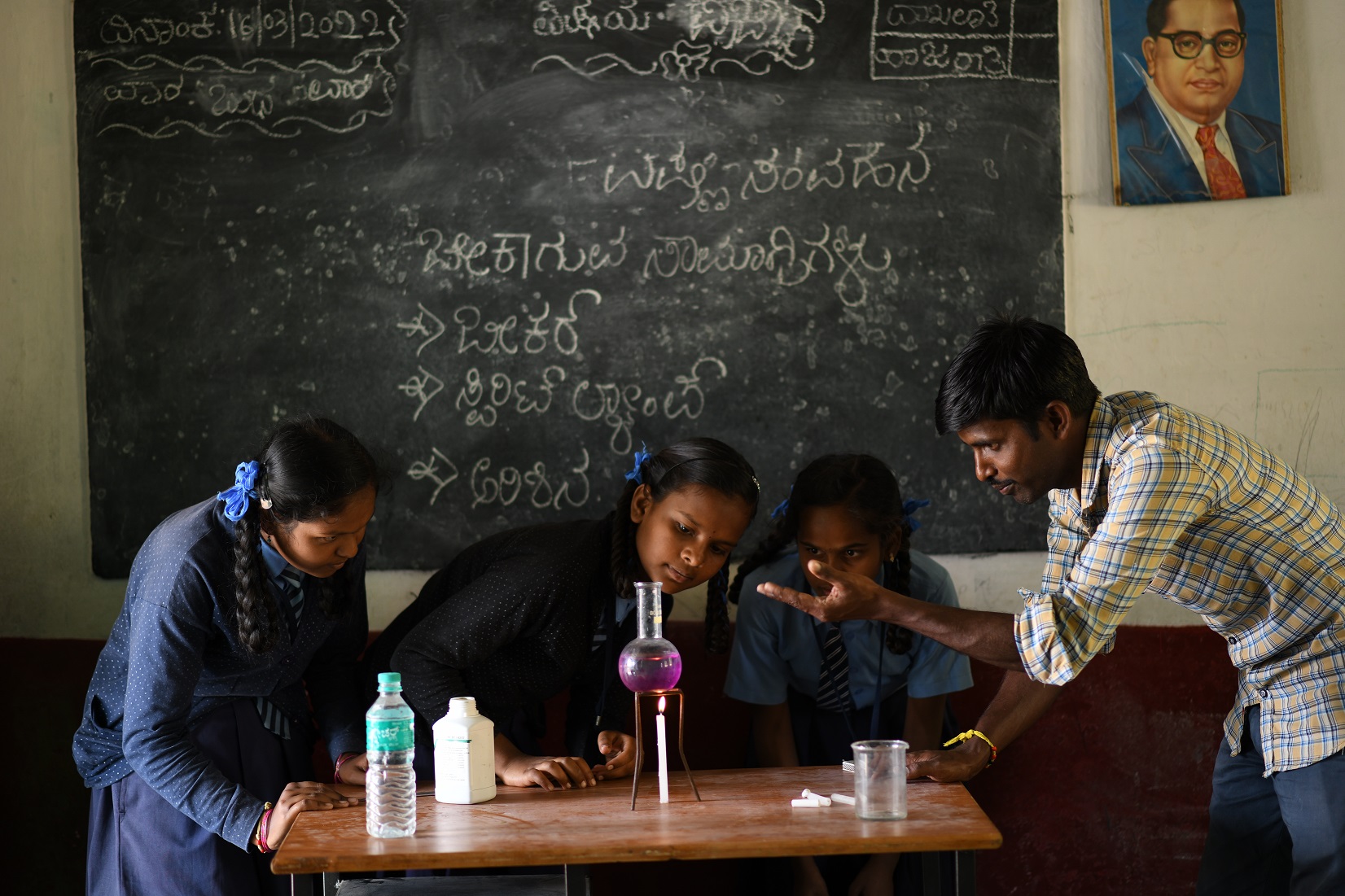
A SVYM School Education Program Facilitator demonstrates a science experiment to Govt. school students in Nanjangudu Taluk
Student Driven Learning Centres
A SDLC setup in a Government High School uses technology to promote peer-to-peer and self-learning among high school students through the use of audio-visual materials based on the curriculum. The AV content has been developed by SVYM and is made accessible to students over the tabs/laptops provided to schools. One period per day is allocated to the SDLC for each section. Workbooks, worksheets and remedial teaching sessions are also organized on a need basis.
The SDLCs are run by the facilitators, and teachers at the respective schools facilitate the same through doubt clarification sessions and revision classes. The learning of the students is tracked through the doubt slips deposited by the students along with the student performance in the periodic tests/assessments done by the teachers.
The SDLCs are helpful in improving the SSLC pass percentage by identifying at risk of failure in SSLC and conducting special sessions for them. Home visits are also carried out by the facilitators to address the challenges of poor attendance or other family issues hindering the learning of the students.
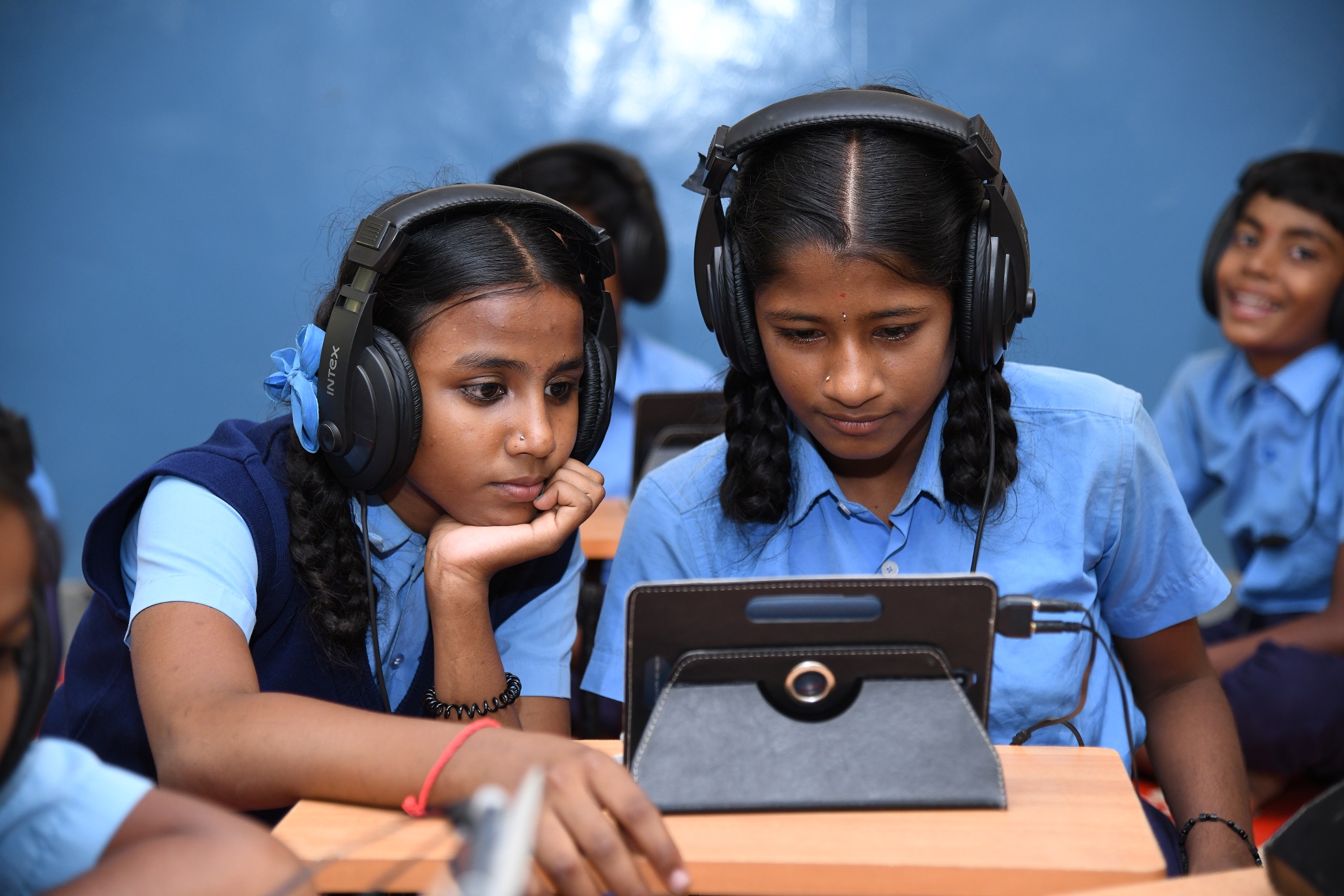
Students using a Tab during an SDLC session
Mobile STEM Labs
In a secondary school, many experiments are carried out once a year i.e., the equipment required to carry out such experiments is required only once a year and the consumables (chemicals/reagents) are required in minimal quantities as compared to what is commercially available.
The Mobile Science Lab shall make the equipment available at a shared cost and ensure optimal utilization of the materials along with creating numerous opportunities for the students and teachers of multiple to interact with each other. Each mobile science lab is equipped with 7-8 sets of equipment required to conduct experiments and improve the children’s understanding of the curriculum.
In a year, each student has an opportunity to spend 8 – 10 hours on these experiments and a mobile science lab can support 20 secondary schools or 40 elementary schools or a combination of those schools. Each session is customized according to the school’s needs i.e., based on the inputs of the science teacher in the schools.
The program also supports setting up functional science labs in the Govt schools where teachers take the initiative in using experiential and activity-based learning as a pedagogy at schools.
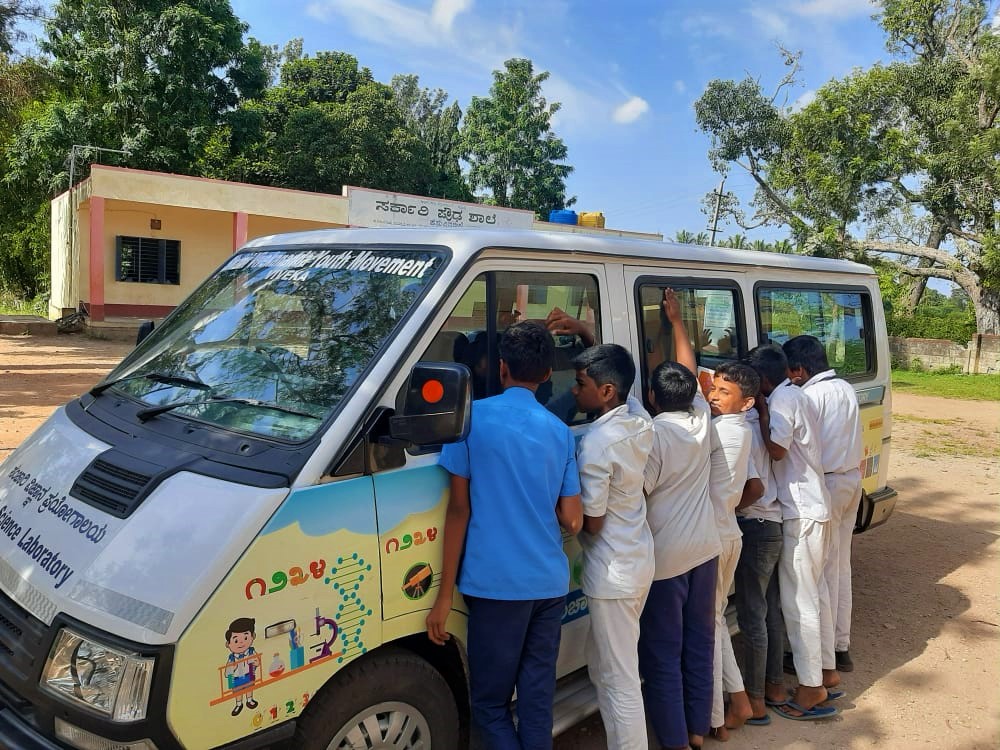
Govt School students circle around a Mobile STEM Lab anticipating some science magic in the lab sessions later
Events & Celebrations
Events & Celebrations are organized at the school and district level on a quarterly and half-yearly basis respectively. These events are conducted around the theme of STEM education and are aimed at –
- Promoting awareness about STEM in our daily life
- Identifying, showcase & nurture talent amongst students and teachers
- Encouraging stakeholder participation in the school including corporate volunteers
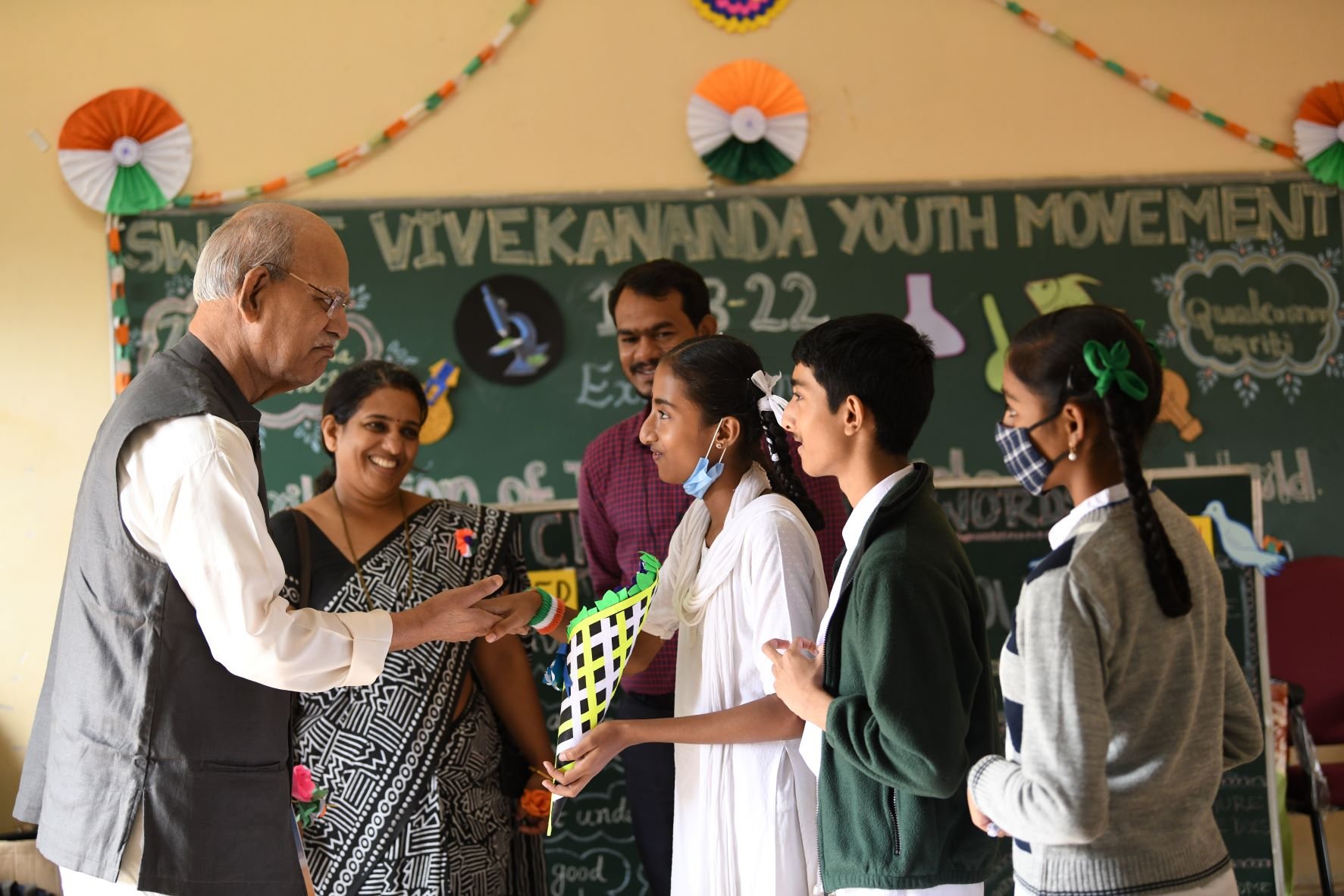
Scholarships
After the students graduate from High Schools, meritorious students from poor socio-economic backgrounds are identified through a thorough multi-step process as given below. Usually, the selection process takes about 8 months from Registration to Admission. For the academic year 2023-2024, the admission process began with over 12,000 registrations from across the state for 200 scholarships being awarded.
The scholarship at the Pre-University is primarily towards the tuition fee and the hostel fee. SVYM has an MoU with like-minded PU colleges across the state. These colleges offer admissions to the students of the Scholar Program at a discounted rate (usually around 50% of the fee) and up to Rs 35,000 of the fee is supported by the program. In the Mysuru centre, the program is a residential program with students enrolling from across the state. The scholarship also supports transport, reference books, uniforms, etc. on a case-to-case basis.
A bridge course is conducted in April – May to prepare the students for the transition from Secondary to Senior Secondary and more importantly the transition from the Kannada medium to the English medium. Periodic parent meetings and student counselling sessions are also conducted to understand the student’s progress and facilitate any additional support required.
A similar selection process is also taken up for the scholarships in Higher Education. Volunteers from the academia, corporate partners and well-wishers of SVYM participate in all aspects of the scholar program. This helps the students get inputs from experts and also reduces the admin costs of the program. Student internships in SVYM and partner institutions are also facilitated
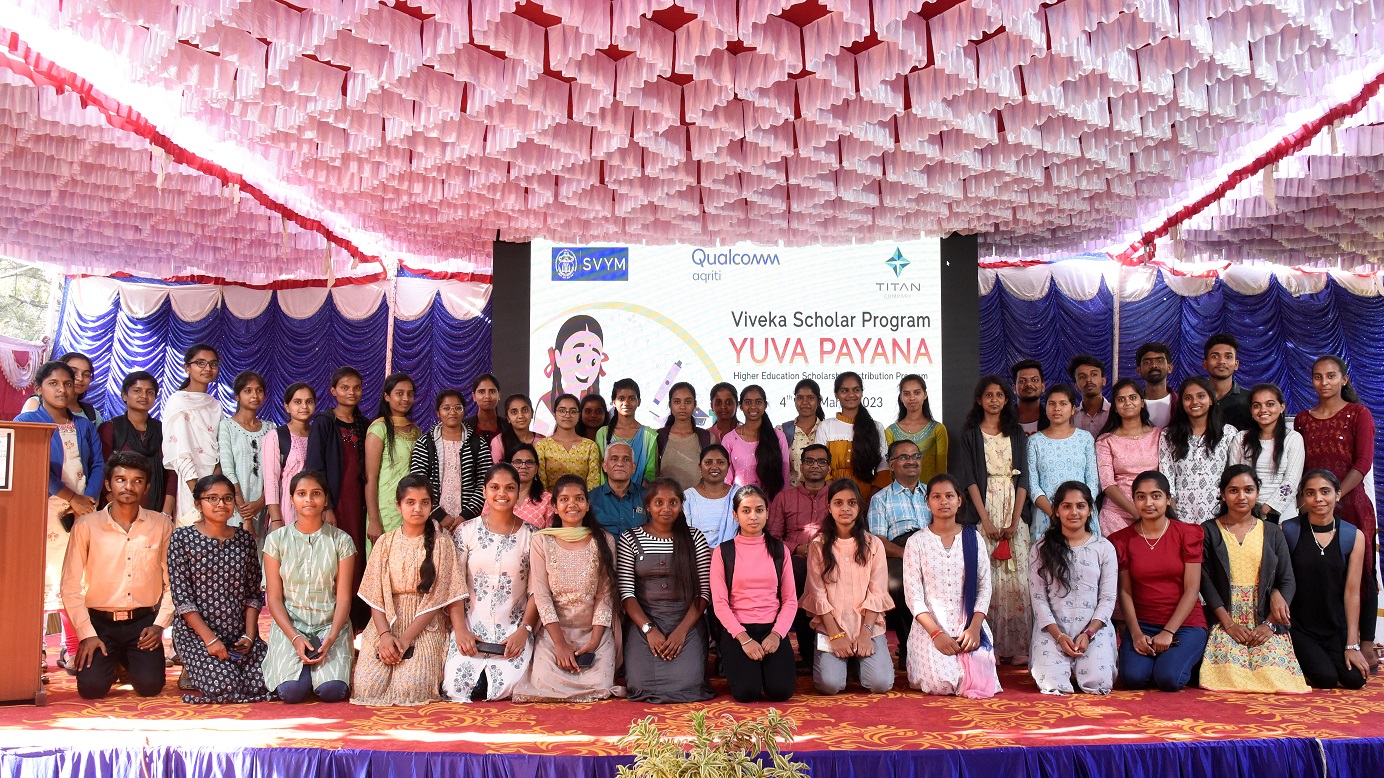
Scholarship distribution program for higher education to meritorious students from a economically humble background
.
Career Guidance
Career guidance sessions are conducted across all the High Schools in Nov – Jan to help the students take an informed decision about their careers. These sessions are customised to provide locally relevant information in addition to building the aspirations of the students. Parents, teachers and SDMC members are encouraged to participate in the career guidance sessions.
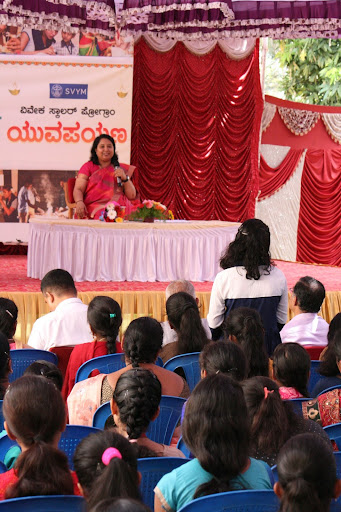
Yuva Payana – An annual event to create a platform for students to interact with people from different walks of life. In pic – Students interact with Smt R Snehal IAS, DC Yadgir
Exposure Visits
Exposure visits are also arranged for a select group of students, parents and teachers to model schools, higher education institutions and relevant Government or Private bodies. These visits are aimed at helping the participants understand the opportunities available to them in building their careers. Exposure visits for parents have created a perceptible difference in the parents’ participation in school activities along with driving accountability of learning outcomes.
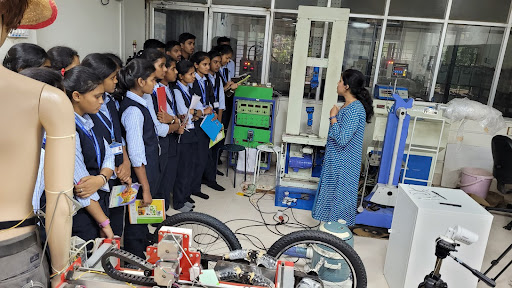
Students in a lab at the National Institute of Technology Surathkal during an exposure visit
Life Skills, WASH & Counselling
Periodic sessions on life skills are conducted by trained facilitators to promote the socio-emotional well-being of the children in the schools. The life skill sessions are based on the WHO recommendations of 10 life skills. Students who are “At the risk of drop-out” or are into smoking, use of drugs, etc. are also identified and appropriate guidance & counselling sessions are facilitated for the students and their parents.
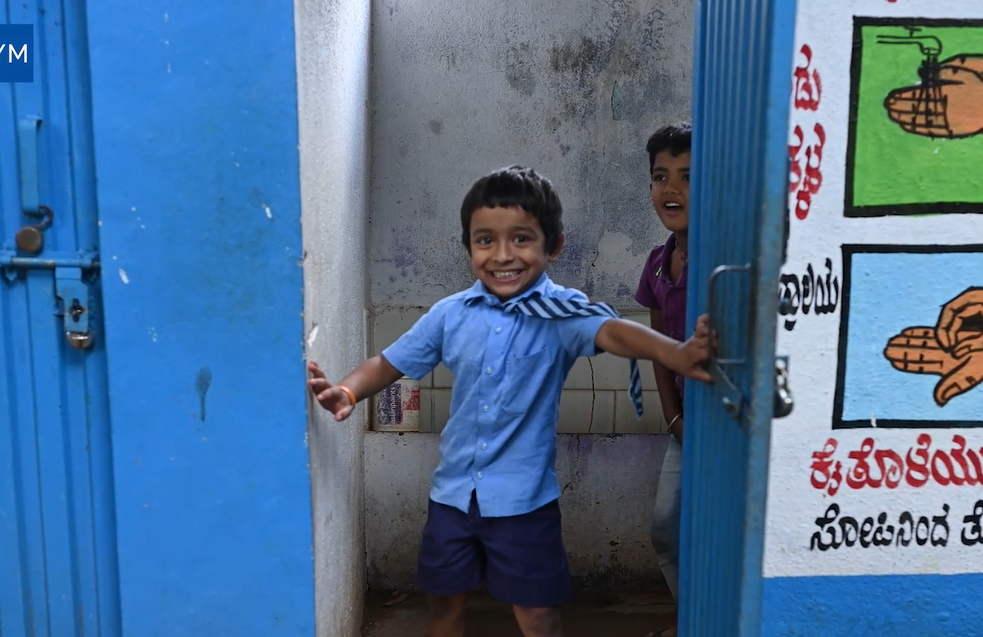
Govt School students are sensitised about hygiene and sanitation to promote health and prevent diseases
IMPACT STORY
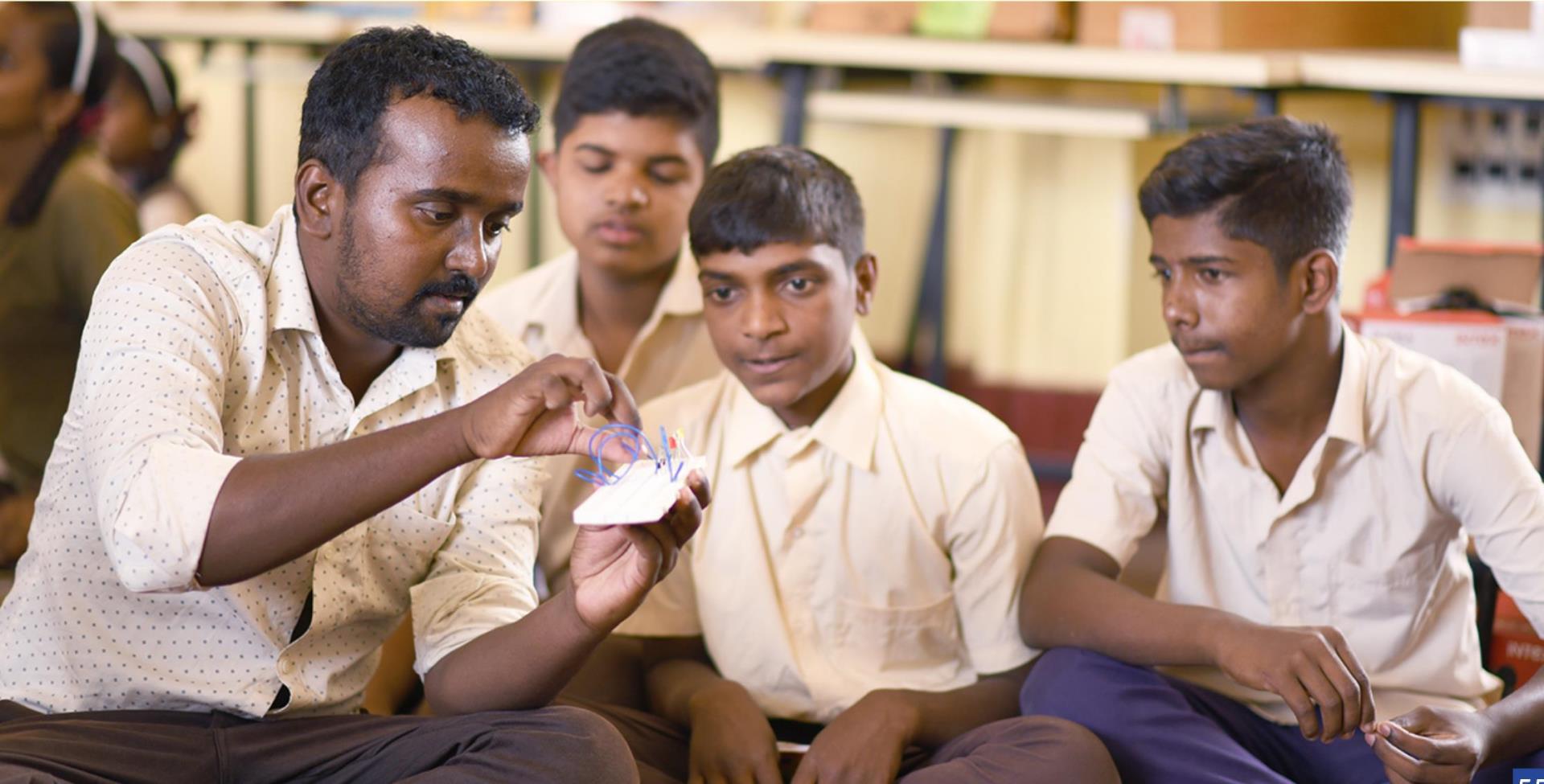
Engineers of a Better Tomorrow!
Our effort towards equitable education through accessible and student centric learning focuses on rural
children studying in Govt Schools.
To implement this vision, SVYM’s School Education Program (SEP) engages students, teachers and School Development & Monitoring Committees (SDMC) in about 106 Govt Schools in Karnataka.
To spark students’ interest in science, theory classes are conducted on a tablet loaded with interactive learning material, videos & quizzes. Students are grouped in three, intentionally pairing the slow and strong learners together. Learning science in Kannada or any native language for that matter has an inbuild handicap. We have conveniently borrowed science terms from English and pairing children together often facilitates in overcoming this challenge in Govt. schools, as children pick words from each other naturally. School Education Program also covers Maths and Social Studies.
Mobile Science Lab, a vehicle that carries & conducts science experiments and provides lab equipment to Govt. schools that don’t have a lab or the equipment attempts to bridge the potential learning gap in rural schools. Observing science days like the Pi Day, Zero Shadow Day & Solar Eclipses etc. take science out of the textbook & into real life soaking the children & teachers alike in curiosity under the sun.
The SEP curriculum is integrated into the school learning hours, & we appreciate the school committee and parent bodies to see the value the program brings in educating our children.
The SEP team also compliments the learning activities in these Govt Schools with WASH components promoting health & hygiene awareness early in a child’s life.
During COVID-19, the SEP remodelled itself into Community Learning Clubs (CLCs) to continue engagement of students through learning activities insmall groups with COVID appropriate measures, the program saw an opportunity to promote self learning by designing special workbooks to engage children cooped up at home. Our staff like everyone else in the education sector also faced job related uncertainties and CLC did a little for them too.
With the SEP Program back in full swing now, the video story of these energetic students from a Govt. School in Nanjangudu shows that they have the potential to become the torchbearers of science & the engineers of a better tomorrow.